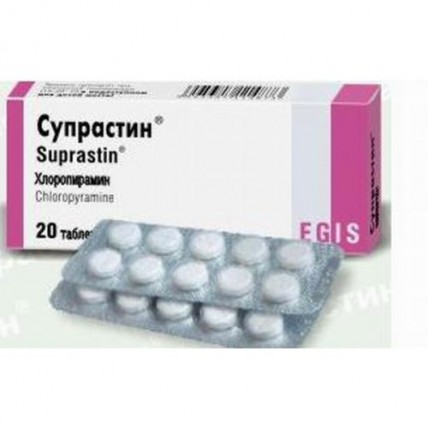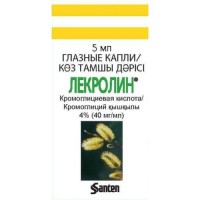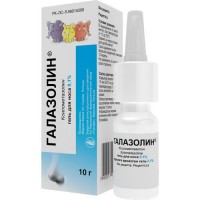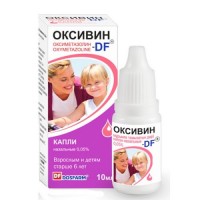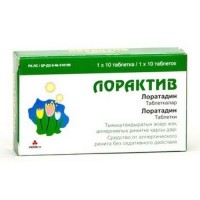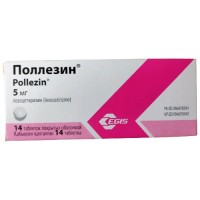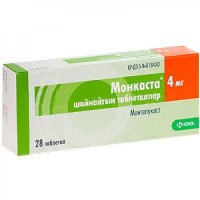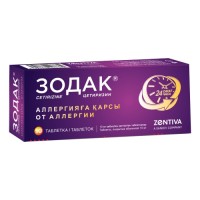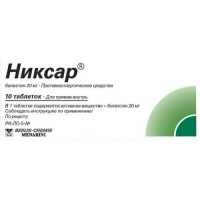Suprastin 25 mg (20 tablets)
- $14.00
The instruction for medical use
of SUPRASTIN® medicine
the Trade name
of Suprastin®
the International unlicensed
name Chloropyraminum Dosage Form
of the Tablet Structure One Tablet contains
active agent - Chloropyraminum a hydrochloride of 25 mg,
excipients: lactoses monohydrate, potato starch, sodium karbokimetilkrakhmat (type A), talc, gelatin, stearic acid.
The description
White or grayish-white tablets in the form of a disk with a facet, with an engraving of SUPRASTIN on one party and risky - on other party of a tablet, without or almost flavourless.
Pharmacotherapeutic group
Antihistaminic drugs of systemic action. The ethylene diamines substituted. Chloropyraminum.
ATH R06AC03 code
the Pharmacological
Pharmacokinetics Later properties of intake Chloropyraminum is quickly soaked up from digestive tract. Its therapeutic effect develops within 15-30 minutes after intake. It is well distributed in an organism, including the central nervous system. Linking with proteins of plasma - 7.9%. The peak of binding is noted at rn 7.4. It is metabolized in a liver. It is removed mainly by kidneys in the form of metabolites. At children the removal of drug happens quicker, than at adult patients.
At patients with an abnormal liver function and kidneys metabolism of Chlorpyraminum goes down therefore there can be a need of lowering of a dose.
A pharmacodynamics
Chloropyraminum - the chlorinated analog of a tripelenamin (piribenzamin) - the antihistaminic drug of the first generation belonging to group of etilendiaminovy antihistaminic drugs. Results of preclinical and clinical trials specify that also as well as tripelenamin, Chloropyraminum can effectively be applied to treatment of hay fever and other allergic diseases. The maximum effect develops within 1 hour and about 3-6 hours proceed.
Indications
- allergic diseases, including urticaria, seasonal allergic rhinitis, allergic conjunctivitis, food and medicinal allergy,
- allergic reactions to stings of insects
- contact dermatitis, a dermatografizm
- adjuvant therapy of system anaphylactic reaction and a Quincke's disease
it is necessary to accept the Route of administration and doses of the Tablet at meal time, without chewing and washing down with enough liquid.
Adult: the recommended dose – 25 mg (1 tablet) 3-4 times a day, if necessary a daily dose increase up to 100 mg (4 tablets).
To children aged: - 1 - 6 years: on ¼ tablets (6.25 mg) 3 times a day or ½ tablets (12.5 mg) 2 times a day (in the pounded look to powder),
- 6 - 14 years: on ½ (12.5 mg) 2-3 times a day.
Further therapy and/or increase in a dose substantially are defined by reaction of the patient and presence of side effects.
The maximum daily dose should not exceed 2 mg/kg of body weight.
At an acute anaphylaxis or acute heavy allergic reaction the treatment is recommended to be begun with a careful slow intravenous injection of Suprastinum then to continue intramuscular injections, then to pass to administration of drug inside.
Use of the drug Suprastinum demands extra care as antihistaminic drugs cause side effects in these patients more often (dizziness, drowsiness, a lowering of arterial pressure) from patients of advanced age and the exhausted patients.
In an abnormal liver function the dose decline in connection with decrease in metabolism of active component of drug in liver diseases can be required.
In a renal failure the change of the mode of administration of drug and a dose decline can be required because active component is generally emitted through kidneys.
Treatment duration:
Duration of treatment depends on the nature of symptoms, time and their manifestation.
Side effects
Seldom (≥ 1/10,000 and & lt, 1/1000)
- a leukopenia, an agranulocytosis, hemolytic anemia, other dyscrasias from the system of blood
It is very rare (& lt, 1/10,000)
- allergic reactions
- sedation, fatigue, dizziness, an ataxy, a tremor, nervous excitement, spasms, a headache, euphoria, encephalopathy
- increase in intraocular pressure, an attack of glaucoma, disturbance of visual acuity
- arterial hypotension, tachycardia, arrhythmia
- loss of appetite (anorexia) or increase, unpleasant feelings or pain in epigastric area, dryness in a mouth, nausea, vomiting, diarrhea, a constipation
- a photosensitization
- a myopathy
- the complicated urination, an ischuria
When prescribing drug it is necessary to consider a possibility of development of sedative side reactions.
Contraindications
- hypersensitivity to active or other auxiliary component of drug
- a peptic ulcer of a stomach and duodenum (aggravation phase)
- a piloroduodenalny stenosis
- a bad attack of bronchial asthma
- premature and newborns children
- pregnancy and the period of a lactation
Medicinal interactions
Inhibitors of a monoaminooxidase (MAO), for example moklobemid or selegilin strengthen and extend anticholinergic effects of Suprastinum.
It is necessary to observe extra care at simultaneous use of Suprastina with barbiturates, anxiolytic sedatives, tranquilizers, opioid analgetics, tricyclic antidepressants, atropine and other muskarinergichesky parasympatholytics (Suprastin and any of these drugs can enhance effects of each other).
Anti-histamine drugs suppress skin reactions in response to allergy skin tests, such patients some days before conducting such skin tests should cancel use of this drug.
At a combination to ototoksichesky drugs Suprastinum can mask precursory symptoms of ototoxicity.
During treatment it is necessary to exclude consumption of alcoholic beverages (alcohol enhances the oppressing effect of Suprastinum on the central nervous system).
Special instructions
Due to presence of anticholinergic and sedative effects it is necessary to appoint with care Suprastin at patients of advanced age and also in an abnormal liver function, a cardiovascular system, in closed-angle glaucoma, an ischuria, a prostate hypertrophy.
Use of drug in late evening hours can strengthen symptoms of a gastro-ezofagalny reflux disease.
At a combination to ototoksichesky drugs Suprastinum can mask precursory symptoms of ototoxicity.
Prolonged use of antihistaminic drugs in rare instances can cause disturbances from the system of a hemopoiesis (leukopenia, an agranulocytosis, thrombocytopenia, hemolytic anemia).
At the developing of fever of not clear origin, laryngitis, an ulceration of a mucous membrane of a mouth, pallor, jaundice, hemorrhages unusual or difficult stopped bleedings, at prolonged use of drug it is necessary to define quantity of uniform elements of blood, and at detection of disturbances from the system of a hemopoiesis the administration of drug should be stopped.
Alcohol enhances sedation of anti-histamine drugs on the central nervous system therefore during treatment of Suprastinom® the consumption of alcoholic beverages is forbidden.
Each tablet contains 116 mg of lactose of monohydrate. Patients should not appoint this drug with rare hereditary intolerance of a galactose, hereditary deficiency of lactase or a sprue of a glucose/galactose.
Pregnancy and the period of a lactation
Are absent data of the controlled clinical trials on use of drug during pregnancy. However at newborns whose mothers took the anti-histamine drugs last months of pregnancy cases of development of a retrolental fibroplasia were described.
Due to the lack of sufficient data drug should not be used when breastfeeding.
Features of influence on ability to run the vehicle and potentially dangerous mechanisms
Drug can cause, especially in an initial stage of treatment, drowsiness and disturbance of psychomotor functions. In initial, individually defined, the period of use of Suprastina driving and occupations is forbidden by other potentially dangerous types of activity demanding speed of psychomotor reactions. In the course of further treatment the extent of restrictions is defined individually in dependence of tolerance of drug.
Overdose
Symptoms: the symptoms and signs characteristic of poisoning with atropine develop: hallucinations, concern, ataxy, lacks of coordination of movements, athetosis, spasms. At children of early age the excitement prevails. Sometimes there is a dryness in a mouth, the fixed expansion of pupils, a dermahemia of the person, sinus tachycardia, an ischuria, fever. At adults the fever and a dermahemia of the person can be absent, and after the period of excitement spasms and a postconvulsive depression, with possible development of a coma and cardiorespiratory insufficiency which can lead to the death of the patient within 2-18 hours follow.
Treatment: Due to the development of anticholinergic effect the advance of food from a stomach is delayed therefore within 12 hours after overdose the gastric lavage and prescribing of activated carbon inside is necessary. Monitoring of indicators of a cardiovascular system and breath and also symptomatic therapy is recommended. Specific antidote is not known.
A form of release and packing
On 10 tablets in blister strip packaging from a film of PVC and aluminum foil. On 2 blister strip packagings (20 tablets) in a cardboard box together with the instruction for medical use on gosudarstven-
the number and Russian languages.
To Store storage conditions at a temperature not higher than 25 wasps.
To store out of children's reach!
Not to use a period of storage of 5 years after an expiration date.
Prescription status
According to the prescription
BUDAPEST CJSC EGIS PHARMACEUTICAL PLANT Producer 1106, Keresturi St., 30-38 Hungary
Phone number: (36-1) 803-5555, the fax: (36-1) 803-5529
Owner of the registration certificate
of CJSC EGIS Pharmaceutical Plant, Hungary
The address of the organization accepting in the territory of the Republic of Kazakhstan claims from consumers on quality of products (goods)
Representation in RK CJSC EGIS Pharmaceutical Plant
050060, Almaty, Zharokov St. of 286 G
ph. + 7 (727) 247 63 34, + 7 (727) 247 63 33, fax: + 7 (727) 247 61 41
e-mail:
To develop egis@egis.kz
of SUPRASTIN® medicine
the Trade name
of Suprastin®
the International unlicensed
name Chloropyraminum Dosage Form
of the Tablet Structure One Tablet contains
active agent - Chloropyraminum a hydrochloride of 25 mg,
excipients: lactoses monohydrate, potato starch, sodium karbokimetilkrakhmat (type A), talc, gelatin, stearic acid.
The description
White or grayish-white tablets in the form of a disk with a facet, with an engraving of SUPRASTIN on one party and risky - on other party of a tablet, without or almost flavourless.
Pharmacotherapeutic group
Antihistaminic drugs of systemic action. The ethylene diamines substituted. Chloropyraminum.
ATH R06AC03 code
the Pharmacological
Pharmacokinetics Later properties of intake Chloropyraminum is quickly soaked up from digestive tract. Its therapeutic effect develops within 15-30 minutes after intake. It is well distributed in an organism, including the central nervous system. Linking with proteins of plasma - 7.9%. The peak of binding is noted at rn 7.4. It is metabolized in a liver. It is removed mainly by kidneys in the form of metabolites. At children the removal of drug happens quicker, than at adult patients.
At patients with an abnormal liver function and kidneys metabolism of Chlorpyraminum goes down therefore there can be a need of lowering of a dose.
A pharmacodynamics
Chloropyraminum - the chlorinated analog of a tripelenamin (piribenzamin) - the antihistaminic drug of the first generation belonging to group of etilendiaminovy antihistaminic drugs. Results of preclinical and clinical trials specify that also as well as tripelenamin, Chloropyraminum can effectively be applied to treatment of hay fever and other allergic diseases. The maximum effect develops within 1 hour and about 3-6 hours proceed.
Indications
- allergic diseases, including urticaria, seasonal allergic rhinitis, allergic conjunctivitis, food and medicinal allergy,
- allergic reactions to stings of insects
- contact dermatitis, a dermatografizm
- adjuvant therapy of system anaphylactic reaction and a Quincke's disease
it is necessary to accept the Route of administration and doses of the Tablet at meal time, without chewing and washing down with enough liquid.
Adult: the recommended dose – 25 mg (1 tablet) 3-4 times a day, if necessary a daily dose increase up to 100 mg (4 tablets).
To children aged: - 1 - 6 years: on ¼ tablets (6.25 mg) 3 times a day or ½ tablets (12.5 mg) 2 times a day (in the pounded look to powder),
- 6 - 14 years: on ½ (12.5 mg) 2-3 times a day.
Further therapy and/or increase in a dose substantially are defined by reaction of the patient and presence of side effects.
The maximum daily dose should not exceed 2 mg/kg of body weight.
At an acute anaphylaxis or acute heavy allergic reaction the treatment is recommended to be begun with a careful slow intravenous injection of Suprastinum then to continue intramuscular injections, then to pass to administration of drug inside.
Use of the drug Suprastinum demands extra care as antihistaminic drugs cause side effects in these patients more often (dizziness, drowsiness, a lowering of arterial pressure) from patients of advanced age and the exhausted patients.
In an abnormal liver function the dose decline in connection with decrease in metabolism of active component of drug in liver diseases can be required.
In a renal failure the change of the mode of administration of drug and a dose decline can be required because active component is generally emitted through kidneys.
Treatment duration:
Duration of treatment depends on the nature of symptoms, time and their manifestation.
Side effects
Seldom (≥ 1/10,000 and & lt, 1/1000)
- a leukopenia, an agranulocytosis, hemolytic anemia, other dyscrasias from the system of blood
It is very rare (& lt, 1/10,000)
- allergic reactions
- sedation, fatigue, dizziness, an ataxy, a tremor, nervous excitement, spasms, a headache, euphoria, encephalopathy
- increase in intraocular pressure, an attack of glaucoma, disturbance of visual acuity
- arterial hypotension, tachycardia, arrhythmia
- loss of appetite (anorexia) or increase, unpleasant feelings or pain in epigastric area, dryness in a mouth, nausea, vomiting, diarrhea, a constipation
- a photosensitization
- a myopathy
- the complicated urination, an ischuria
When prescribing drug it is necessary to consider a possibility of development of sedative side reactions.
Contraindications
- hypersensitivity to active or other auxiliary component of drug
- a peptic ulcer of a stomach and duodenum (aggravation phase)
- a piloroduodenalny stenosis
- a bad attack of bronchial asthma
- premature and newborns children
- pregnancy and the period of a lactation
Medicinal interactions
Inhibitors of a monoaminooxidase (MAO), for example moklobemid or selegilin strengthen and extend anticholinergic effects of Suprastinum.
It is necessary to observe extra care at simultaneous use of Suprastina with barbiturates, anxiolytic sedatives, tranquilizers, opioid analgetics, tricyclic antidepressants, atropine and other muskarinergichesky parasympatholytics (Suprastin and any of these drugs can enhance effects of each other).
Anti-histamine drugs suppress skin reactions in response to allergy skin tests, such patients some days before conducting such skin tests should cancel use of this drug.
At a combination to ototoksichesky drugs Suprastinum can mask precursory symptoms of ototoxicity.
During treatment it is necessary to exclude consumption of alcoholic beverages (alcohol enhances the oppressing effect of Suprastinum on the central nervous system).
Special instructions
Due to presence of anticholinergic and sedative effects it is necessary to appoint with care Suprastin at patients of advanced age and also in an abnormal liver function, a cardiovascular system, in closed-angle glaucoma, an ischuria, a prostate hypertrophy.
Use of drug in late evening hours can strengthen symptoms of a gastro-ezofagalny reflux disease.
At a combination to ototoksichesky drugs Suprastinum can mask precursory symptoms of ototoxicity.
Prolonged use of antihistaminic drugs in rare instances can cause disturbances from the system of a hemopoiesis (leukopenia, an agranulocytosis, thrombocytopenia, hemolytic anemia).
At the developing of fever of not clear origin, laryngitis, an ulceration of a mucous membrane of a mouth, pallor, jaundice, hemorrhages unusual or difficult stopped bleedings, at prolonged use of drug it is necessary to define quantity of uniform elements of blood, and at detection of disturbances from the system of a hemopoiesis the administration of drug should be stopped.
Alcohol enhances sedation of anti-histamine drugs on the central nervous system therefore during treatment of Suprastinom® the consumption of alcoholic beverages is forbidden.
Each tablet contains 116 mg of lactose of monohydrate. Patients should not appoint this drug with rare hereditary intolerance of a galactose, hereditary deficiency of lactase or a sprue of a glucose/galactose.
Pregnancy and the period of a lactation
Are absent data of the controlled clinical trials on use of drug during pregnancy. However at newborns whose mothers took the anti-histamine drugs last months of pregnancy cases of development of a retrolental fibroplasia were described.
Due to the lack of sufficient data drug should not be used when breastfeeding.
Features of influence on ability to run the vehicle and potentially dangerous mechanisms
Drug can cause, especially in an initial stage of treatment, drowsiness and disturbance of psychomotor functions. In initial, individually defined, the period of use of Suprastina driving and occupations is forbidden by other potentially dangerous types of activity demanding speed of psychomotor reactions. In the course of further treatment the extent of restrictions is defined individually in dependence of tolerance of drug.
Overdose
Symptoms: the symptoms and signs characteristic of poisoning with atropine develop: hallucinations, concern, ataxy, lacks of coordination of movements, athetosis, spasms. At children of early age the excitement prevails. Sometimes there is a dryness in a mouth, the fixed expansion of pupils, a dermahemia of the person, sinus tachycardia, an ischuria, fever. At adults the fever and a dermahemia of the person can be absent, and after the period of excitement spasms and a postconvulsive depression, with possible development of a coma and cardiorespiratory insufficiency which can lead to the death of the patient within 2-18 hours follow.
Treatment: Due to the development of anticholinergic effect the advance of food from a stomach is delayed therefore within 12 hours after overdose the gastric lavage and prescribing of activated carbon inside is necessary. Monitoring of indicators of a cardiovascular system and breath and also symptomatic therapy is recommended. Specific antidote is not known.
A form of release and packing
On 10 tablets in blister strip packaging from a film of PVC and aluminum foil. On 2 blister strip packagings (20 tablets) in a cardboard box together with the instruction for medical use on gosudarstven-
the number and Russian languages.
To Store storage conditions at a temperature not higher than 25 wasps.
To store out of children's reach!
Not to use a period of storage of 5 years after an expiration date.
Prescription status
According to the prescription
BUDAPEST CJSC EGIS PHARMACEUTICAL PLANT Producer 1106, Keresturi St., 30-38 Hungary
Phone number: (36-1) 803-5555, the fax: (36-1) 803-5529
Owner of the registration certificate
of CJSC EGIS Pharmaceutical Plant, Hungary
The address of the organization accepting in the territory of the Republic of Kazakhstan claims from consumers on quality of products (goods)
Representation in RK CJSC EGIS Pharmaceutical Plant
050060, Almaty, Zharokov St. of 286 G
ph. + 7 (727) 247 63 34, + 7 (727) 247 63 33, fax: + 7 (727) 247 61 41
e-mail:
To develop egis@egis.kz
